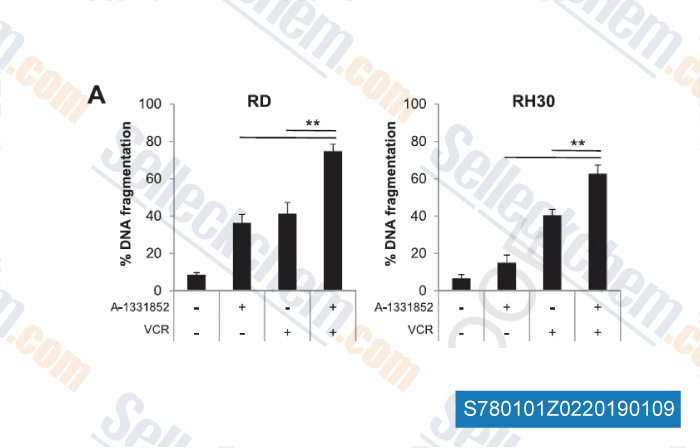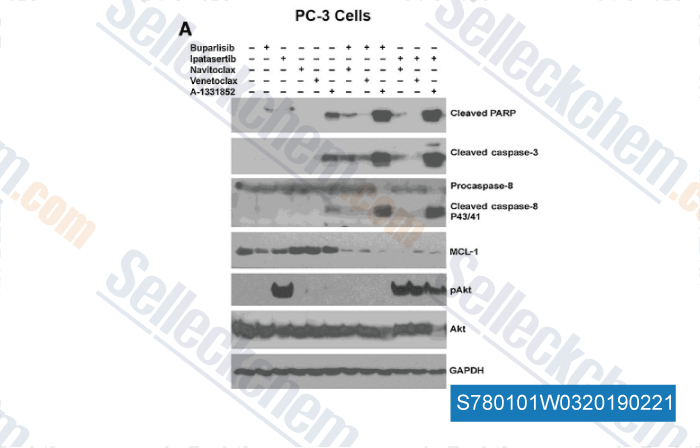|
Toll Free: (877) 796-6397 -- USA and Canada only -- |
Fax: +1-832-582-8590 Orders: +1-832-582-8158 |
Tech Support: +1-832-582-8158 Ext:3 Please provide your Order Number in the email. |
Technical Data
| Formula | C38H38N6O3S |
||||||
| Molecular Weight | 658.81 | CAS No. | 1430844-80-6 | ||||
| Solubility (25°C)* | In vitro | DMSO | 100 mg/mL (151.78 mM) | ||||
| Water | Insoluble | ||||||
| Ethanol | Insoluble | ||||||
| In vivo (Add solvents to the product individually and in order) |
|
||||||
|
* <1 mg/ml means slightly soluble or insoluble. * Please note that Selleck tests the solubility of all compounds in-house, and the actual solubility may differ slightly from published values. This is normal and is due to slight batch-to-batch variations. * Room temperature shipping (Stability testing shows this product can be shipped without any cooling measures.) |
|||||||
Preparing Stock Solutions
Biological Activity
| Description | A-1331852 is a potent and selectiveBCL-XL inhibitor with Ki value less than 0.01 nM for BCL-XL and 6 nM, 4 nM, 142 nM for Bcl-2, Bcl-W, MCL-1 respectively. It may be useful in the treatment of cancer, immune and autoimmune diseases. | ||
|---|---|---|---|
| Targets |
|
||
| In vitro | A-1331852 exhibits remarkable potency both as a single agent and in combination with TKIs in killing primary CD34+ CML cell. Also, It has remarkable potency in inducing apoptosis in these cells at low nanomolar concentrations as early as 1 h post-treatment[2]. | ||
| In vivo | A-1331852 demonstrates antitumor efficacy in the Molt-4 xenograft model, inducing tumor regressions as a single agent[1]. |
Protocol (from reference)
| Cell Assay:[2] |
|
|---|---|
| Animal Study:[1] |
|
References
|
Customer Product Validation

-
Data from [Data independently produced by , , Cancer Lett, 2018, 412:131-142]

-
Data from [Data independently produced by , , Mol Cancer Res, 2016, 14(12):1176-1181]
Selleck's A-1331852 has been cited by 61 publications
| LP-118 is a novel B-cell lymphoma 2 / extra-large inhibitor that demonstrates efficacy in models of venetoclaxresistant chronic lymphocytic leukemia [ Haematologica, 2025, 110(1):78-91] | PubMed: 39113656 |
| Mitochondrial priming and response to BH3 mimetics in "one-two punch" senogenic-senolytic strategies [ Cell Death Discov, 2025, 11(1):91] | PubMed: 40055336 |
| Bcl‑xL‑specific BH3 mimetic A‑1331852 suppresses proliferation of fluorouracil‑resistant colorectal cancer cells by inducing apoptosis [ Oncol Rep, 2025, 53(2)26] | PubMed: 39717947 |
| HRK downregulation and augmented BCL-xL binding to BAK confer apoptotic protection to therapy-induced senescent melanoma cells [ Cell Death Differ, 2024, 10.1038/s41418-024-01417-z] | PubMed: 39627361 |
| Decreased apoptotic priming and loss of BCL-2 dependence are functional hallmarks of Richter's syndrome [ Cell Death Dis, 2024, 15(5):323] | PubMed: 38724507 |
| Anti-leukemia efficacy of the dual BCL2/BCL-XL inhibitor AZD0466 in acute lymphoblastic leukemia preclinical models [ Blood Adv, 2024, bloodadvances.2024013423] | PubMed: 39561378 |
| BH3-mimetics or DNA-damaging agents in combination with RG7388 overcome p53 mutation-induced resistance to MDM2 inhibition [ Apoptosis, 2024, 10.1007/s10495-024-02014-8] | PubMed: 39222276 |
| Fatty acid synthase (FASN) is a tumor-cell-intrinsic metabolic checkpoint restricting T-cell immunity [ Cell Death Discov, 2024, 10(1):417] | PubMed: 39349429 |
| Osteosarcoma cells depend on MCL-1 for survival, and osteosarcoma metastases respond to MCL-1 antagonism plus regorafenib in vivo [ BMC Cancer, 2024, 24(1):1350] | PubMed: 39497108 |
| Gravitational and mechanical forces drive mitochondrial translation [ bioRxiv, 2024, 10.1101/2023.01.18.524628] | PubMed: none |
RETURN POLICY
Selleck Chemical’s Unconditional Return Policy ensures a smooth online shopping experience for our customers. If you are in any way unsatisfied with your purchase, you may return any item(s) within 7 days of receiving it. In the event of product quality issues, either protocol related or product related problems, you may return any item(s) within 365 days from the original purchase date. Please follow the instructions below when returning products.
SHIPPING AND STORAGE
Selleck products are transported at room temperature. If you receive the product at room temperature, please rest assured, the Selleck Quality Inspection Department has conducted experiments to verify that the normal temperature placement of one month will not affect the biological activity of powder products. After collecting, please store the product according to the requirements described in the datasheet. Most Selleck products are stable under the recommended conditions.
NOT FOR HUMAN, VETERINARY DIAGNOSTIC OR THERAPEUTIC USE.
